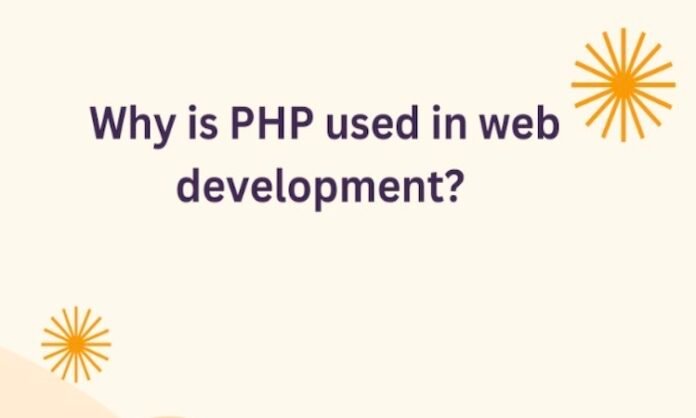PHP (Hypertext Preprocessor) is a widely used server-side scripting language that was specifically designed for web development.
It is popular for several reasons:
- Easy to Learn and Use
- Platform Independence:
- Web Integration
- Extensive Frameworks and Libraries
- Large Community and Resources
- Scalability
- Cost-effective
1. Easy to Learn and Use
PHP has a simple and straightforward syntax that is similar to C and other programming languages

PHP is generally considered to be relatively easy to learn for several reasons:
1. Syntax: PHP has a syntax similar to C and other programming languages, making it familiar to many developers.
2. Abundance of Resources: PHP has been around for a long time and has a large and active community.
3. Beginner-Friendly Features: PHP offers features that make it easy for beginners to start coding.
4. Wide Adoption: PHP is widely used in the web development industry, and there are numerous job opportunities available for PHP developers.
However, it’s important to note that while PHP may be relatively easy to learn, mastering the language and becoming a proficient developer requires practice and experience.
2. Platform Independence
PHP runs on various platforms such as Windows, Linux, macOS, and UNIX. This makes it highly flexible and compatible with different operating systems, enabling developers to deploy their applications across a wide range of environments.
There are a few reasons why PHP is considered platform-independent:
- Interpreted Language: PHP is an interpreted language, meaning that it is executed by an interpreter rather than compiled into machine code.
2. Cross-Platform Compatibility: PHP code itself is not platform-specific. It primarily relies on web servers that support PHP to interpret and execute the code.
3. Web-Based Nature: PHP is primarily used for web development, where it operates on the server side to generate dynamic web content.
While PHP itself is platform-independent, it’s important to note that PHP applications can interact with other components that may have platform-specific dependencies
3. Web Integration
PHP seamlessly integrates with various web technologies, such as HTML, CSS, JavaScript, and databases like MySQL.
PHP is primarily used for server-side scripting, which means it runs on the web server to generate dynamic web content and interact with databases and other resources.
Here are some key aspects of web integration in PHP:
1. Server-Side Processing: PHP is executed on the server before the web page is sent to the client’s browser.
2. Web Server Configuration: To integrate PHP into a web application, you need to have a web server that supports PHP. Popular web servers like Apache, Nginx, or Microsoft IIS have modules or extensions specifically designed to handle PHP code.
3. Embedding PHP Code: PHP code can be embedded directly into HTML files using specific delimiters, typically <?php and?>.
4. Interacting with Databases: PHP provides built-in functions and extensions to interact with databases such as MySQL, PostgreSQL, and SQLite.
5. Handling Web Forms: PHP is commonly used to handle form submissions on the server side.
6. External API Integration: PHP can also integrate with external APIs (Application Programming Interfaces) provided by other web services or platforms.
Web integration in PHP provides the flexibility to build dynamic, interactive, and data-driven web applications by leveraging the server-side processing capabilities and integrating with various web technologies and services.
4. Extensive Frameworks and Libraries
PHP has a vast ecosystem of frameworks and libraries that simplify web development tasks. Frameworks like Laravel, Symfony, and CodeIgniter provide structured patterns, ready-to-use modules, and libraries for building complex web applications efficiently.
Here are some of the popular Framework Used in PHP
- Laravel: Laravel is one of the most widely used PHP frameworks known for its elegant syntax and expressive features.
- Symfony: Symfony is a robust and highly customizable PHP framework that emphasizes code reusability and modularity.
- CodeIgniter: CodeIgniter is a lightweight and straightforward PHP framework that is known for its simplicity and small footprint.
- Zend Framework: Zend Framework (now called Laminas Project) is a powerful and feature-rich PHP framework that offers a wide range of reusable components for building robust web applications.
- Slim: Slim is a micro-framework for PHP that is designed for creating small and simple web applications or APIs.
Here are some of the popular Libraries Used in PHP
1. Guzzle: A popular PHP HTTP client library for making HTTP requests to external APIs.
2. PHPUnit: A unit testing framework for PHP that helps developers write automated tests for their code.
3. Swift Mailer: A feature-rich library for sending emails from PHP applications.
4. Carbon: A date and time library that provides a more expressive and convenient way to work with dates and times in PHP.
5. Monolog: A logging library that allows you to handle logging and debugging in PHP applications.
5. Large Community and Resources
PHP has a large and active community of developers who contribute to its growth and provide support through forums, online communities, and extensive documentation.
Here are some of the key aspects of the PHP community and the resources it offers:
1. Official PHP Website: The official PHP website (php.net) serves as a central hub for all things PHP.
2. PHP Community Forums: There are numerous PHP community forums where developers can ask questions, seek help, and engage in discussions.
3. Online Tutorials and Courses: There is a wide range of online tutorials, courses, and learning resources available for PHP.
4. Open-Source Projects: PHP has a rich ecosystem of open-source projects, libraries, and frameworks.
5. Conferences and Events: PHP conferences and events provide opportunities for developers to network, learn from industry experts, and stay up to date with the latest trends and advancements in PHP development.
6. Community Blogs and Podcasts: Many PHP developers and experts maintain blogs or host podcasts dedicated to PHP development.
6. Scalability
PHP is highly scalable, allowing developers to build applications that can handle high traffic loads and scale as needed. Combined with efficient caching mechanisms, PHP can perform well even in demanding environments.
Here are some important aspects of scalability in PHP:
1. Load Balancing: Load balancing involves distributing incoming requests across multiple servers or resources to evenly distribute the workload.
2. Caching: Caching is a technique used to store frequently accessed data in a cache, such as in-memory systems like Memcached or Redis.
3. Database Optimization: As the data volume increases, database performance can become a bottleneck.
4. Horizontal Scaling: Horizontal scaling involves adding more servers or resources to handle increasing traffic and workloads.
5. Optimized Code and Performance Tuning: Writing efficient and optimized PHP code is crucial for scalability.
6. Cloud Infrastructure: Leveraging cloud platforms like Amazon Web Services (AWS), Google Cloud Platform (GCP), or Microsoft Azure can provide flexible and scalable infrastructure options.
7. Cost-effective
PHP is an open-source language, meaning it is free to use and distribute. It eliminates the need for costly software licenses, making it an affordable choice for web development projects.
PHP is often considered cost-effective for several reasons:
1. Open-Source and Free: PHP itself is an open-source programming language, which means it is freely available for anyone to use and modify.
2. Hosting and Deployment: PHP applications can be hosted on a wide range of hosting providers, many of which offer affordable hosting plans specifically tailored for PHP.
3. Wide Range of Resources: PHP has a large and active community that creates and shares a vast amount of free resources, such as frameworks, libraries, tutorials, and code samples.
4. Integration with Popular Tools and Technologies: PHP integrates well with other widely used open-source technologies and tools, such as databases (MySQL, PostgreSQL), web servers (Apache, Nginx), and content management systems (WordPress, Drupal).
5. Rapid Development: PHP is known for its simplicity and ease of use, which facilitates rapid application development.
6. Wide Talent Pool: PHP has been around for a long time and has a large developer community.
While PHP itself offers cost advantages, it’s important to note that the overall cost-effectiveness of a PHP project also depends on factors like project complexity, infrastructure requirements, and ongoing maintenance.
Varixkumar Patel
Varixkumar Patel is the Founder and CEO of Software Development company Covrize. His work experience involves playing critical growth in two of the Software Majors of Ahmedabad. He is an expert in planning for optimal resource utilization, proactive hiring, policy formation, employee retention and much more.

